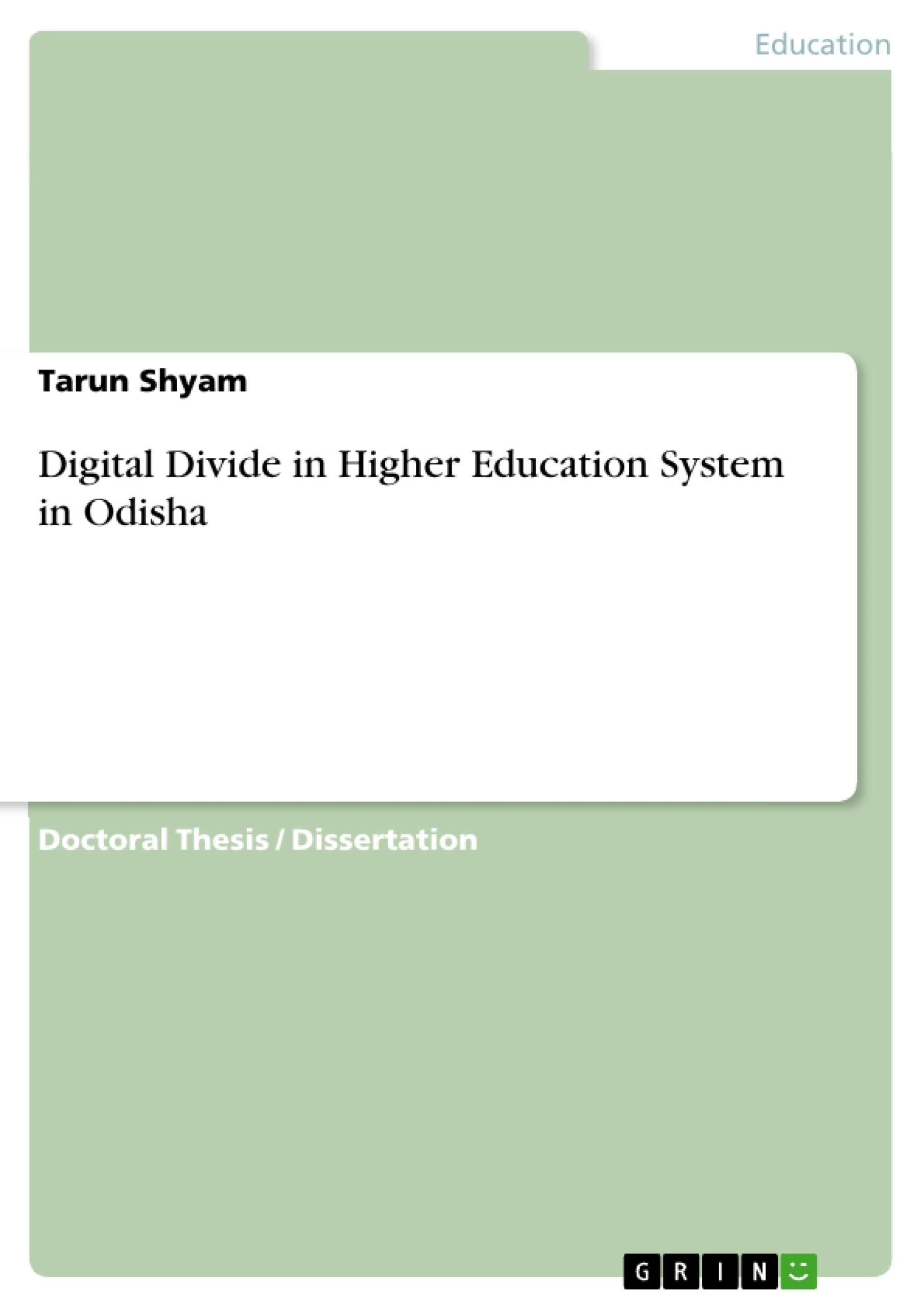
Digital Divide in Higher Education System in Odisha
Doktorarbeit / Dissertation, 2022
199 Seiten
Leseprobe
Inhaltsverzeichnis (Table of Contents)
- Chapter I: Introduction to the Study
- Chapter II: Literature Review
- Chapter III: Research Methodology
- Chapter IV: Data Analysis
- Chapter V: Findings, Suggestions and Conclusion
Zielsetzung und Themenschwerpunkte (Objectives and Key Themes)
This thesis explores the digital divide in the higher education system of Odisha, examining the accessibility and impact of information technology on students. The research aims to understand the challenges and opportunities associated with bridging the digital divide, ultimately contributing to the advancement of inclusive education in the region.
- The influence of digital access on academic performance and opportunities.
- Factors contributing to the digital divide in higher education, such as socioeconomic disparities, infrastructure limitations, and digital literacy gaps.
- The potential of technology-driven educational programs and resources to enhance learning experiences and facilitate equitable access to knowledge.
- Strategies for mitigating the digital divide and promoting inclusive digital literacy practices within higher education institutions.
Zusammenfassung der Kapitel (Chapter Summaries)
Chapter I introduces the concept of the digital divide and its relevance in the context of higher education. It contextualizes the study within the Odia higher education landscape, outlining the research objectives and methodology. Chapter II reviews existing literature on the digital divide, exploring various perspectives on its origins, implications, and potential solutions. Chapter III delves into the research methodology employed, including data collection techniques, sampling strategies, and data analysis methods.
Schlüsselwörter (Keywords)
The primary focus of this research is on the digital divide in higher education, particularly in Odisha. Key themes and concepts explored include digital access, information technology, inclusivity, educational opportunities, socioeconomic disparities, technology-driven learning, and digital literacy.
What is the "digital divide" in the context of higher education?
The digital divide refers to the gap between those who have access to modern information technology (the "haves") and those who do not (the "have-nots"), affecting academic performance and opportunities.
Why is information considered a "development resource"?
In a knowledge economy, reliable information is essential for societal advancement in science, technology, and education. A lack of it is seen as the essence of underdevelopment.
What are the specific challenges in Odisha's higher education system?
The thesis explores factors like socioeconomic disparities, infrastructure limitations, and gaps in digital literacy that contribute to the divide in Odisha.
How can web-based educational programs help bridge the gap?
Web-based programs and digital libraries create constructivist learning environments where students can explore and experiment, potentially facilitating equitable access to knowledge.
What is the goal of this research on Odisha's digital divide?
The research aims to understand the challenges of IT accessibility and propose strategies for promoting inclusive digital literacy in higher education institutions.
Details
- Arbeit zitieren
- Tarun Shyam (Autor:in), 2022, Digital Divide in Higher Education System in Odisha, München, Page::Imprint:: GRINVerlagOHG, https://www.diplomarbeiten24.de/document/1298332
- Autor werden
- Ihre Optionen
- Vertriebskanäle
- Premium Services
- Autorenprofil
- Textarten und Formate
- Services für Verlage, Hochschulen, Unternehmen

- © GRIN Publishing GmbH.
- Alle Inhalte urheberrechtlich geschützt. Kopieren und verbreiten untersagt.
- info@grin.com
- AGB
- Open Publishing
Der GRIN Verlag hat sich seit 1998 auf die Veröffentlichung akademischer eBooks und Bücher spezialisiert. Der GRIN Verlag steht damit als erstes Unternehmen für User Generated Quality Content. Die Verlagsseiten GRIN.com, Hausarbeiten.de und Diplomarbeiten24 bieten für Hochschullehrer, Absolventen und Studenten die ideale Plattform, wissenschaftliche Texte wie Hausarbeiten, Referate, Bachelorarbeiten, Masterarbeiten, Diplomarbeiten, Dissertationen und wissenschaftliche Aufsätze einem breiten Publikum zu präsentieren.
Kostenfreie Veröffentlichung: Hausarbeit, Bachelorarbeit, Diplomarbeit, Dissertation, Masterarbeit, Interpretation oder Referat jetzt veröffentlichen!
- GRIN Verlag GmbH
-
- Nymphenburger Str. 86
- 80636
- Munich, Deutschland
- +49 89-550559-0
- +49 89-550559-10
- info@grin.com
-









